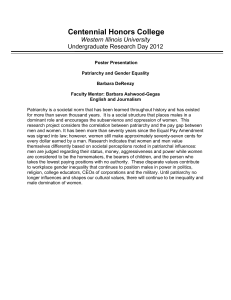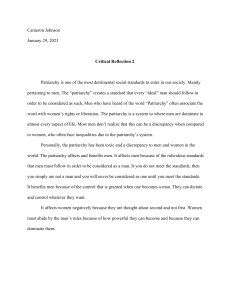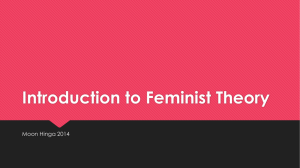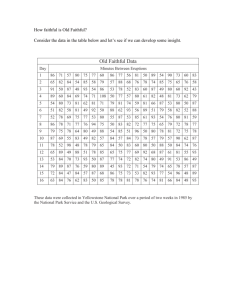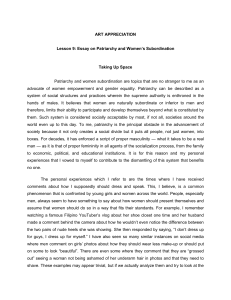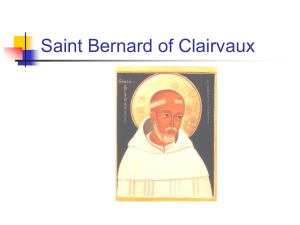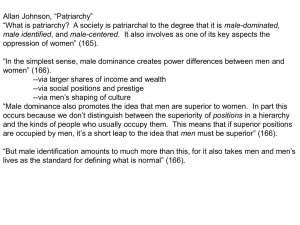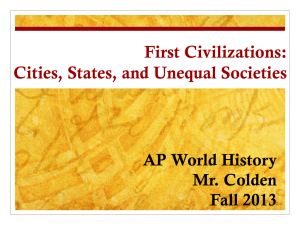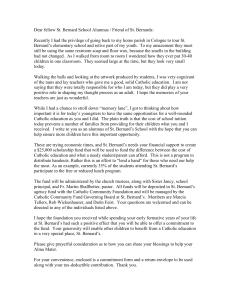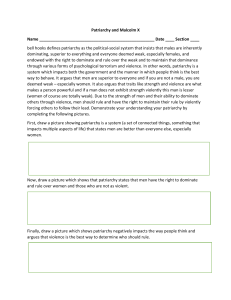Handbook for William Notes
advertisement
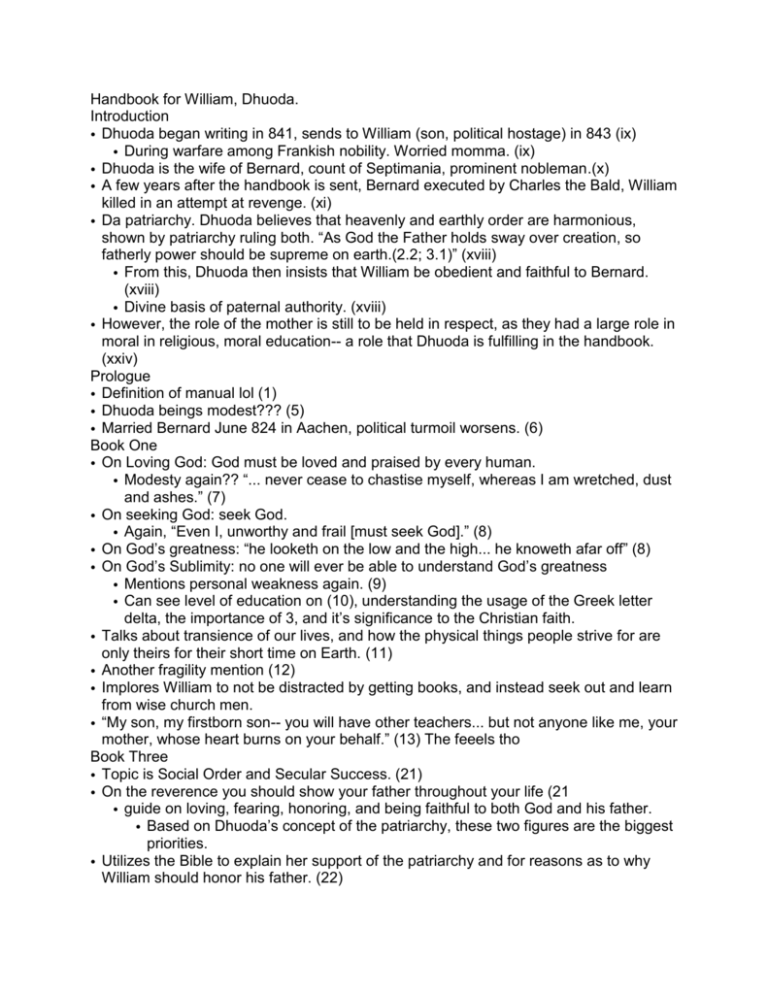
Handbook for William, Dhuoda. Introduction • Dhuoda began writing in 841, sends to William (son, political hostage) in 843 (ix) • During warfare among Frankish nobility. Worried momma. (ix) • Dhuoda is the wife of Bernard, count of Septimania, prominent nobleman.(x) • A few years after the handbook is sent, Bernard executed by Charles the Bald, William killed in an attempt at revenge. (xi) • Da patriarchy. Dhuoda believes that heavenly and earthly order are harmonious, shown by patriarchy ruling both. “As God the Father holds sway over creation, so fatherly power should be supreme on earth.(2.2; 3.1)” (xviii) • From this, Dhuoda then insists that William be obedient and faithful to Bernard. (xviii) • Divine basis of paternal authority. (xviii) • However, the role of the mother is still to be held in respect, as they had a large role in moral in religious, moral education-- a role that Dhuoda is fulfilling in the handbook. (xxiv) Prologue • Definition of manual lol (1) • Dhuoda beings modest??? (5) • Married Bernard June 824 in Aachen, political turmoil worsens. (6) Book One • On Loving God: God must be loved and praised by every human. • Modesty again?? “... never cease to chastise myself, whereas I am wretched, dust and ashes.” (7) • On seeking God: seek God. • Again, “Even I, unworthy and frail [must seek God].” (8) • On God’s greatness: “he looketh on the low and the high... he knoweth afar off” (8) • On God’s Sublimity: no one will ever be able to understand God’s greatness • Mentions personal weakness again. (9) • Can see level of education on (10), understanding the usage of the Greek letter delta, the importance of 3, and it’s significance to the Christian faith. • Talks about transience of our lives, and how the physical things people strive for are only theirs for their short time on Earth. (11) • Another fragility mention (12) • Implores William to not be distracted by getting books, and instead seek out and learn from wise church men. • “My son, my firstborn son-- you will have other teachers... but not anyone like me, your mother, whose heart burns on your behalf.” (13) The feeels tho Book Three • Topic is Social Order and Secular Success. (21) • On the reverence you should show your father throughout your life (21 • guide on loving, fearing, honoring, and being faithful to both God and his father. • Based on Dhuoda’s concept of the patriarchy, these two figures are the biggest priorities. • Utilizes the Bible to explain her support of the patriarchy and for reasons as to why William should honor his father. (22) • “First of all you love God... Then love, fear, and cherish your father.” (23) • Her idea of what William’s priorities should be. • Biblical examples of fathers. (25) • On taking counsel: if William is called to the council of magnates, he should carefully consider what, how, when, to whom he talks, and to act with the advice to behave loyally. (27) • This is to help him maneuver the hairy political situations he will probably be facing. She wants to keep him safe from the consequences of rash word or action. • Also, obligatory “seek the wisdom of God.” (28) • Associate with people, young or old, of God (28) • Godly people may influence him to make better choices. Wise counselors. • Fear, love, honor, cherish people that fight alongside him in royal and imperial court--make allies, not enemies. (31) • Be patient with Charles (32) ---aka, don’t die. • When dealing with magnates, show them love and service, learn from them. (33) • God loves the humble, so don’t be afraid to show kindness to those of lower station, but also learn from those of greater station as well. (34-35) • “If you love all, all will love you.” (35) Mutual support, which her son kinda needs. Respect priests, they do God’s work. • • Goes on to explain church leaders‘ roles and why they are worthy of reverence (39-40) Book Four • Moral Betterment • Another example of her level of education: use of different texts such as Synonyms (43) • “Anger killeth the young man, and envy slayeth the little one” • Observe the examples of great men in the past, present, future. (45) • Mostly in relation to faithfulness to the Lord. • Dhuoda reminds him of the danger of his time. (46) • Don’t be proud, God resists the proud (46) • She is definitely using God as a way to convey the lessons she wants her child to learn. • By upholding the Christian morals, can obtain seven spiritual gifts. (47) • Be pure, don’t give into anger, show compassion, show patience, pity the poor, love justice, be merciful Book Five • Sorrow in life can lead towards eternal life and joy. (65) • Fragility of happiness in people. (67) • Urges William to praise God and take the fruit of the Spirit, charity, joy, patience, benignity, goodness, etc... (68) • Amend sins quickly (69) • Avoid temptation, be patient in difficulty, do not worry about persecution, keep faith despite hardship and deprivation, illness. Give glory to God in all circumstances. (7073) Book Seven • Two births in Catholic Christianity- physical birth, then spiritual birth (79) • Be strong in first birth, then steadfast in second birth (79-80) • Two deaths. The physical one is inevitable, the second is not, and the result is eternal life with the saints. (80-81) Book Eight • Grow strong in reading and prayer-- pray without ceasing. (83) • Pray for the past, present, future. (83) • Pray for the clergy, bishops and priests, kings and others of high rank, for his father, for those that oppose him, for travelers, faithful that have died, both those that were good and not good, everyone, especially the baptized and those of the faith, dead relations.
